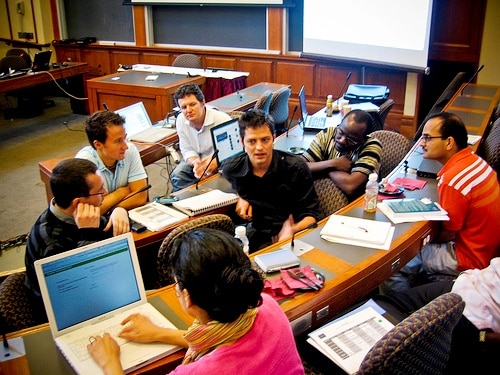21st Century Revolutionary Conferences Have Transformed The Traditional Education Session
Conferences that focus primarily on lecture-based methods are becoming increasingly difficult to defend!
There is ample evidence that the lecture creates phony learning, along with the inability to retain and apply what has been heard.
Packed conference sessions and smile-sheet summary evaluations only indicate that attendees can successfully sit through dreary lectures. It does not demonstrate value or stimulate growth in organizations.
Neglecting Evidence Based Education Is Understandable…To Some Degree
The neglect of conference organizers and hosts to apply scientifically sound, evidence based education methods to their conference education is understandable…to some degree. It’s the only thing they know. It mimics what they saw practiced in school institutions. We thought it worked.
But how many of us really learned from our teacher or professor’s lecture? How many of us could walk out of a lecture and pass an exam or apply what we’ve learned? Very few of us!
We still had to study the information. Most of us studied in small groups where we collaborated with others through peer learning. That’s where the real learning occurred, not in the lecture.
Conference organizers need to work with education professionals to secure and offer effective education sessions. They need to obtain speakers that understand the importance of designing learning activities combined with their lectures.
If speakers are oriented to information transmission and expert-focused, they actually hinder learning. We have to coach and secure speakers oriented to learning-centric experiences and oriented to conceptual change.
Ample Evidence That Demands Change
We should offer to our conference customers the kind of education that results in learning. It’s learning that lasts and helps our customers achieve some of their most important goals.
Learning should be seen as a qualitative change in a person’s way of seeing, experiencing, understanding, conceptualizing something in the real world—rather than as a quantitative change in the amount of knowledge someone posses. (Ramsden, 1988, p. 271)
There is more than 20+ years of research and evidence in the neuroscience, cognitive psychology and biology that lectures do not result in deep learning and active learning does.
Active learning, not passive listening to a lecture, works! And it works better than what conferences are typically offering today: the lecture or panel.
Active learning is when adults as learners get involved in doing something integrated with listening to a lecture. They are engaged in activities that involve reflection, assessment, collaboration, cooperative activities, discussion and peer to peer sharing.
5 Active Learning Principals
Evidence from learning sciences, cognitive science and education psychology uncovers five critical principles that conference should embrace:
1. Learning involves active mental construction.
Adults must be involved in actively constructing their own meaning in order to learn. They do this by combining what they know with the new information and meaning they are making. This makes learning a deeply personal process and not a mere transmission of knowledge from speakers’ mouth to listeners’ ear.
2. Learning facts and applying information are two different processes.
Just because they heard your lecture does not mean they can recall the important facts or apply the information. They have not learned it yet.
3. Practice makes perfect.
It is only when the learner can consider the information within the context of their situation and discuss steps for application that learning occurs.
4. Peer learning rules.
Evidence shows that learners retain, understand and can apply more when they learn with others. Sitting passively listening to a discussion is not peer learning.
5. Discussions facilitate learning.
Meaningful learning occurs by articulating explanations and describing how to apply the information through reflection or with others.
Sources: “Where the evidence of actual learning works,” by J. Michaels, Advances in Physiology Education, 2006; Improving Learning New Perspectives, P. Ramsden, 1988.
Why do scientists, who base so much of their work and life on science and evidence, not apply evidence based education to their conference education lectures? What tips do you have for transitioning away from conference lectures only to sessions that integrate active learning?



Love it, Jeff!!! I’m giving a presentation at a symposium later this month in Switzerland — and a core message is that the difference in conferences and learning for 2015 and beyond is that we’ll be focused on the lessons from behavioral and learning sciences. Technology isn’t the headline any more…authentic learning is!